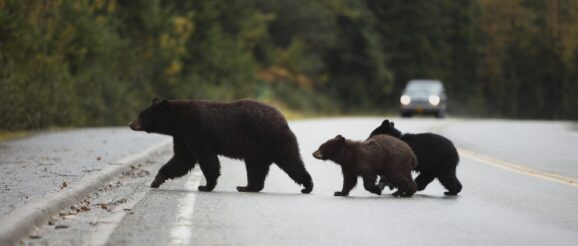Expect to see more wildlife as time change alters human behaviour

North Island bears say daylight savings time doesn’t work for them.
Originally published in the North Island Eagle News, November 13, 2020
Resident black bears in the Tri-Port communities appear to be balking at the issue of daylight savings, prompting a small wildlife gathering to protest the human time keeping invention. One protestor, Mrs. Furry Bearanstine of Port Hardy, told reporters yesterday that the majority of wildlife on the North Island has internal biological clocks that dictate their behaviour. “We don’t have actual human clocks in our dens, so it’s quite confusing for us and our cubs.”
The confusion appears to come from changing traffic patterns and adjusting human behaviours along the North Island highway. “Every year we sort of establish a pattern of when vehicles will be on the road and people in the bush and trails. Based on those patterns, we try to avoid humans the best we can” said Bearanstine.
Daylight savings time, however, throws a wrench into resident bears and other wildlife being able to predict and avoid human interactions. Said Bearanstine, “humans have very arbitrary rules that often dictate their behaviour [for example, time keeping and garbage days]. I just hope they watch out for us as they are running around being weird with their clocky things.”
Mr. Wolf, a resident of Cape Scott agrees. “It’s so unpredictable. Every year the humans just up and swing these little plastic arms around for no apparent reason and then start walking their dogs and driving their cars at different times. It’s really hard to keep track of their behavioural patterns. I often think they are habituated to odd social norms.”
The issue that really concerns Mr. Wolf is the lack of understanding humans appear to have about sightings and unintended interactions. “Basically, once the humans start moving around at different times it takes wildlife a bit to realize what’s going on and that they have done the clock thing again.” Mr. Wolf added, “sometimes we bump into each other accidently because of this, but that’s not a reason to call the police or fish and wildlife services.”
The resident black bears are calling for increased human awareness and education for citizens and drivers about the impact of daylight savings on wildlife. Other wildlife might soon join the call for changing the way time is changed.
With files from the associated wild press –
Ok, admittedly, the above fictitious account of a bear and wolf speaking to a reporter is slightly fabricated – although that’s exactly how I envision it playing out, if a bear could speak! There is one thing that remains true, when humans change their behaviour because they adjust their clocks, there is a small transition period every year as people adjust.
During this adjustment period, especially in North Island communities, it is likely that you will suddenly notice things that you did not see before. As you break from routine and adjust to the new time, each individual person is often altering well established personal behaviours and patterns. As a result, sometimes things seem different until new behavioural patterns and norms are once again set.
Over the next few weeks, dear reader, please expect to ‘see’ more wildlife, especially when driving (actually, the wildlife has always been there, but you may ‘notice’ it differently). And it is not just our four-legged friends that we need to be on the lookout for. It’s the same for our human counterparts. As our behaviours change, it’s important to also watch for our two-legged colleagues, neighbours, and friends.
There you have it. Bears don’t believe in time change; and time change itself changes the way our personal behaviours and patterns adjust. Keep an eye on the road, keep an eye on the critters, keep an eye out for your friends – expect others (human and non-human) and don’t be alarmed if you view things through a slightly different lens over the next few weeks. It’s normal.
Dr. Bryce Casavant is a social scientist and former BC Conservation Officer. He writes from his home on Vancouver Island.
